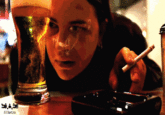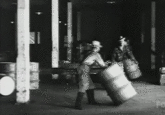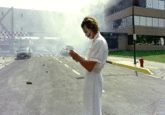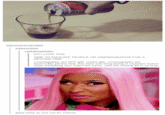Cinemagraphs
Part of a series on Perfectly Looped GIFs. [View Related Entries]

About
Cinemagraphs are partially animated photographs in which a subtle movement action occurs. The effect is produced by taking a series of continuous shot photographs or a video recording and compositing the frames into an animated GIF file.
Origin
Prior to the introduction of cinemagraph, similar animated GIFs were posted to the Three Frames Tumblr[14] blog as early as April 30th, 2009. A style of animated GIF known as a "wigglegram" was created that uses stereoscopy techniques to make an image appear as if it is 3D (shown left below).


The first known animated GIF to use cinemagraph techniques like masking and looping was posted via the Tumblr blog "If We Don't, Remember Me"[1] on October 30th, 2010. The image (shown right above) featured a scene from the 1980 psychological horror film The Shining starring Jack Nicholson.
Coinage
The term "cinemagraph" was coined on March 19th, 2011[3] by New York fashion photographer Jamie Beck and graphic designer Kevin Burg, who posted the first cinemagraphs titled "les tendrils"[2] on their "From Me to You"[2] Tumblr blog on Februfary 13th, 2011. The post received moderate attention with over 540 likes and reblogs.

According to the official single topic blog Cinemagraphs.com[8], Beck and Burg named the process "Cinemagraphs" for their cinematic quality while maintaining at its soul the principles of traditional photography.
Spread
On March 23rd, two cinemagraph posts on the From Me to You blog were picked up via Tumblr with thousands of reblogs and likes, with the monochromic subway GIF[16] receiving over 38,000 notes in total.

On April 16th, 2011, articles about cinemagraphs on Tumblr were posted to the art blog An Aesthetic Discourse[9], and Daily Picks and Flicks.[10] On April 23rd, Dernando Baez posted a tutorial article on his blog[5] explaining how to make a cinemagraph using Photoshop. The Huffington Post also interviewed Beck and Burg on April 26th, shedding light on the evolved form of animated GIFs.
In June 2011, the cinemagraph trend was covered by the Washington Post[12] and Tubefilter News.[13] iThe next month, they appeared on Gizmodo[19] and in October of that year, they were featured on Lifehacker[17] and Mashable.[18]
iPhone Apps
There are iPhone apps that allow users to create cinemagraphs directly from their phone, including Cinemagram[20][21] developed by Factyle Inc and GIFture developed by Toaast.[22] Click on the thumbnails below to visit iTunes.

 #
#Notable Examples
Most cinemagraphs have since spread via popular photo-sharing communities like Tumblr[4] and Flickr[6]; in just under a year since its launch in March 2011, the main Flickr "Cinemagraphs" group has gained over 373 items and 558 members. For more examples, browse KYM Gallery – Cinemagraphs.




Search Interest
Search queries for "cinemagraphs" began picking up in early April of 2011, and peaked later that month. This correlates with the publishing dates of many of the first blog posts about the images.
External References
[1] Tumblr – If we don't, remember me
[2] Tumblr – les tendrils
[3] Twitter – First usage of the term cinemagraph
[4] Fernando Jbaez (via Wayback Machine) – Cinemagraph Tutorial
[5] Tumblr – #cinemagraph
[6] Flickr – cinemagraphs
[7] Gilt Taste – video based cinemagraphs
[8] Cinemagraph – Cinemagraphs.com
[9] An Aesthetic Discourse – The Cinemagraphs
[10] Daily Picks and Flicks – Cinemagraphs: Animated GIFS as Art
[12] Washington Post – Cinemagraphs: What it looks like when a photo moves
(requires subscription)
[13] Tubefilter News – Cinemagraphs are Animated Gifs for Adults
[15] Wikipedia – Stereoscopy#Wiggle_stereoscopy
[16] From Me To You – The Neverending Commute
[17] Lifehacker – How to Create Animated Cinemagraphs
[18] Mashable – How a Blogging Duo Is Changing Fashion Photography With Animated Cinemagraphs
[19] Gizmodo – 36 Incredible Photos…That Move
[20] iTunes – Cinemagram
[21] Tumblr – Cinemagram
















Top Comments
Sumo
Jul 16, 2011 at 12:48AM EDT
Memelicious
Jul 22, 2011 at 04:01AM EDT